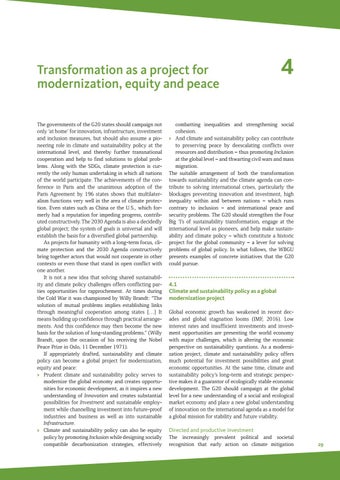Transformation as a project for modernization, equity and peace The governments of the G20 states should campaign not only ‘at home’ for innovation, infrastructure, investment and inclusion measures, but should also assume a pioneering role in climate and sustainability policy at the international level, and thereby further transnational cooperation and help to find solutions to global problems. Along with the SDGs, climate protection is currently the only human undertaking in which all nations of the world participate. The achievements of the conference in Paris and the unanimous adoption of the Paris Agreement by 196 states shows that multilateralism functions very well in the area of climate protection. Even states such as China or the U.S., which formerly had a reputation for impeding progress, contributed constructively. The 2030 Agenda is also a decidedly global project; the system of goals is universal and will establish the basis for a diversified global partnership. As projects for humanity with a long-term focus, climate protection and the 2030 Agenda constructively bring together actors that would not cooperate in other contexts or even those that stand in open conflict with one another. It is not a new idea that solving shared sustainability and climate policy challenges offers conflicting parties opportunities for rapprochement. At times during the Cold War it was championed by Willy Brandt: “The solution of mutual problems implies establishing links through meaningful cooperation among states […] It means building up confidence through practical arrangements. And this confidence may then become the new basis for the solution of long-standing problems.” (Willy Brandt, upon the occasion of his receiving the Nobel Peace Prize in Oslo, 11 December 1971). If appropriately drafted, sustainability and climate policy can become a global project for modernization, equity and peace: >> Prudent climate and sustainability policy serves to modernize the global economy and creates opportunities for economic development, as it inspires a new understanding of Innovation and creates substantial possibilities for Investment and sustainable employment while channelling investment into future-proof industries and business as well as into sustainable Infrastructure. >> Climate and sustainability policy can also be equity policy by promoting Inclusion while designing socially compatible decarbonization strategies, effectively
4
combatting inequalities and strengthening social cohesion. >> And climate and sustainability policy can contribute to preserving peace by deescalating conflicts over resources and distribution – thus promoting Inclusion at the global level – and thwarting civil wars and mass migration. The suitable arrangement of both the transformation towards sustainability and the climate agenda can contribute to solving international crises, particularly the blockages preventing innovation and investment, high inequality within and between nations – which runs contrary to inclusion – and international peace and security problems. The G20 should strengthen the Four Big ‘I’s of sustainability transformation, engage at the international level as pioneers, and help make sustainability and climate policy – which constitute a historic project for the global community – a lever for solving problems of global policy. In what follows, the WBGU presents examples of concrete initiatives that the G20 could pursue.
4.1 Climate and sustainability policy as a global modernization project Global economic growth has weakened in recent decades and global stagnation looms (IMF, 2016). Low interest rates and insufficient investments and investment opportunities are presenting the world economy with major challenges, which is altering the economic perspective on sustainability questions. As a modernization project, climate and sustainability policy offers much potential for investment possibilities and great economic opportunities. At the same time, climate and sustainability policy’s long-term and strategic perspective makes it a guarantor of ecologically stable economic development. The G20 should campaign at the global level for a new understanding of a social and ecological market economy and place a new global understanding of innovation on the international agenda as a model for a global mission for stability and future viability.
Directed and productive investment The increasingly prevalent political and societal recognition that early action on climate mitigation
29
